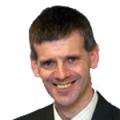Michael Wolfenden, 89, is a retired telecommunications engineer who believes it is crucial for people to plan for - and to keep active in - retirement
AS WE travel along the timeline of life from birth to the inevitable point where we meet the Grim Reaper those of us who are fortunate enough to last the whole course pass through several transition points.
Infancy gives us the basic mobility and communication skills while childhood prepares us for whatever adult role we chose for ourselves.
As adults we may or may not have any part in maintaining the continuity of humanity but we certainly have to earn or acquire the means of supporting ourselves and any dependents for the rest of our lives.
We may not have many options in the transitions on the timeline of babyhood/infant, infant/child, child/adult but we do have choices when we reach the point where we retire from full-time work into retirement.
This is a transition point for which there are no hard and fast rules as we are all very different with targets in mind that fit in with our own approach to life.
I think many people will approach retirement with little idea of their post-work lives, which can be a dangerous viewpoint.
I recall what happened when a colleague in a College of Further Education came to the end of his career and retired. He had absolutely no idea of what he might be doing as a retiree and it came as no surprise when he died six months later - we buried him in the leafy Brookwood Cemetery.
Others may look forward to an unrestricted period of golf and holidaying but this has limited benefit.
I first gave thought of retirement in 1946, while I was a junior Royal Naval officer under training and the post-war government, headed by Clement Attlee, introduced social security benefits that were essentially funded by National Insurance contributions from both the employer and the employe.
This was plainly a major step forward and I saw nothing wrong in making such contributions, which I kept going throughout my working life, much of which was spent overseas where I actually had no obligation to do so.
I thought it important to retain rights that would almost certainly be important later in life.
Nine years from retirement, at the age of 55, from the overseas staff of Cable & Wireless plc I was a lecturer at the company’s engineering college in West Cornwall.
I had not been trained as a teacher - I was a mobile staff engineer in a company that took the view that “you can go anywhere and do anything”, a philosophy that seemed to work.
Looking into the future I could see that this was a possibility worth exploring but I lacked any teaching qualification.
I found a suitable certificate course on offer at the technical college in Camborne and spent winter evenings being formally taught how to teach. The resultant certificate was accepted by Surrey County Council and, on retirement, I spent eight years as a lecturer in Brooklands College of Further Education, which plugged the financial gap until I became eligible for the state pension.
This was only part of the story as I determined to spend as much of my time in retirement doing different things, such as voluntary work with the National Trust, SSAFA and Age UK, as these kept me in contact with people.
Much later on I became a member of Probus which introduces a very necessary social element.
I became involved in local affairs as clerk of a very busy parish council, which had finance commitments well in excess of the usual parish and I served as a parish councillor.
My wife and I travelled extensively both overseas and in this country but by far the most challenging occupation I handled was that of full-time organist in several parishes from Berkshire to South Lakeland, which was never possible in my working life.






Comments: Our rules
We want our comments to be a lively and valuable part of our community - a place where readers can debate and engage with the most important local issues. The ability to comment on our stories is a privilege, not a right, however, and that privilege may be withdrawn if it is abused or misused.
Please report any comments that break our rules.
Read the rules here